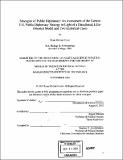Strategies of public diplomacy : an assessment of the current U.S. public diplomacy strategy in light of a directional, elite-oriented model and two historical cases
Author(s)
Crow, Ryan Michael, 1980-
DownloadFull printable version (6.547Mb)
Other Contributors
Massachusetts Institute of Technology. Dept. of Political Science.
Advisor
Roger Petersen.
Terms of use
Metadata
Show full item recordAbstract
While undoubtedly the most powerful nation in the world, the U.S. is constrained in its ability to further its national interests by the attitudes and actions of foreign governments and, more importantly, foreign publics. The growing ability of individuals and small groups to threaten the security and vital interests of the United States necessitates improved cooperation and empathy on the part of foreign publics as well as their governments. Moreover, the concurrent decline in the utility of military statecraft due to both higher costs and decreasing international legitimacy means that policymakers are forced to consider alternative means of influencing the behavior of others. Public diplomacy is a critically important example of such an alternative means. Unfortunately, understanding public diplomacy and its effects is hampered by a lack of conceptual tools used to develop and evaluate various strategies of public diplomacy. Consequently, the following paper seeks to combine existing theoretical arguments regarding strategic communication and mass persuasion to develop an analytical model that can be used to critique the United States' current public diplomacy strategy. According to the model developed and tested herein, strategic directionality and the level of elite orientation are the two primary causal factors that determine the outcome of a particular public diplomacy campaign. Target audience predisposition and the degree to which the campaign itself is concealed from the audience serve as two intervening variables that may retard the progress of a campaign. Thus, the diagrammatical structure of the model is as follows: Directional Message + Elite-Oriented Message --> Successful PD Campaign Intervening Variables: Predisposition Concealment of Campaign. When tested against Britain's efforts to recruit the U.S. as an ally prior to the end of 1941 and Kuwait's efforts to retain the support of the U.S. after Iraq's invasion in August 1990, the model is found to be sound. The model predicts that the current U.S. public diplomacy campaign in the Middle East will fail due to a lack of strategic directionality, limited elite orientation, and poor concealment of the campaign itself. By way of conclusion, several policy prescriptions are offered to improve the levels of each of these variables.
Description
Thesis (S.M.)--Massachusetts Institute of Technology, Dept. of Political Science, 2003. Includes bibliographical references.
Date issued
2003Department
Massachusetts Institute of Technology. Department of Political SciencePublisher
Massachusetts Institute of Technology
Keywords
Political Science.